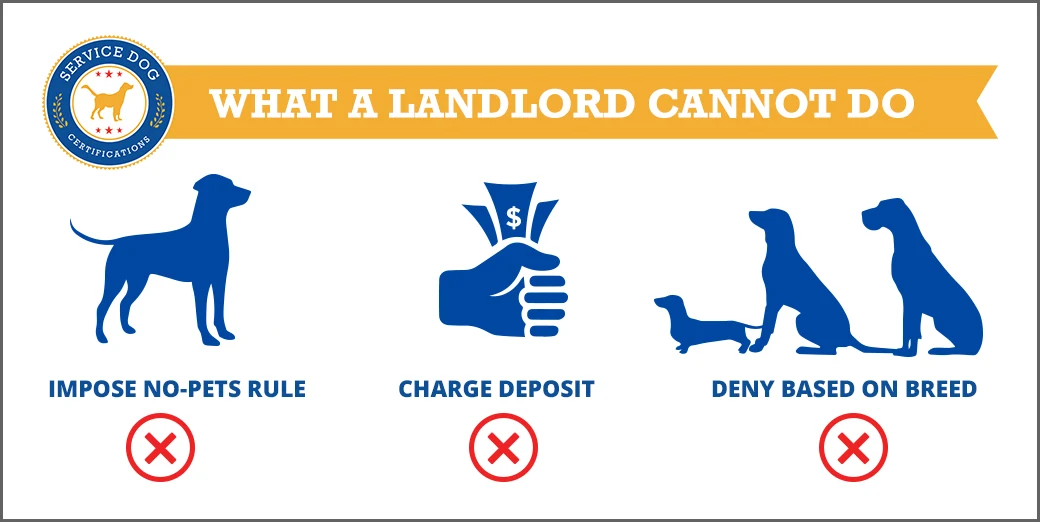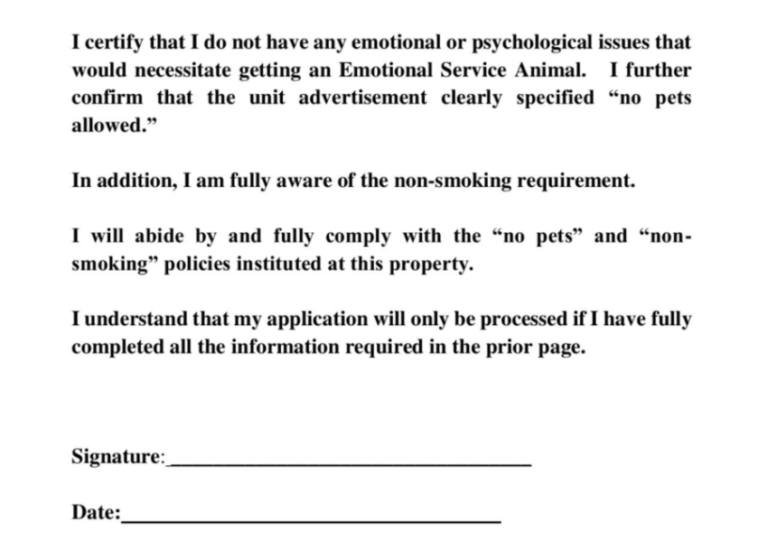A landlord can require documentation for a service dog if the need for the animal is not obvious or known. In certain cases, a property owner may request proof from a qualified professional or someone in a position to know the need for the assistance animal.
In the United States, many individuals with disabilities rely on service dogs to assist them in their daily lives. These highly trained animals provide vital support and assistance to their owners, enabling them to navigate the world more independently. However, when it comes to renting a home or apartment, there can be some confusion regarding whether a landlord can require documentation for a service dog.
This article aims to provide a clear and concise answer to this question, taking into account the legal rights of both landlords and individuals with disabilities. By understanding the regulations surrounding service dogs and landlord requirements, both parties can ensure a fair and respectful accommodation process.
Understanding The Legal Rights Of Landlords And Tenants
When it comes to service dogs, it is important for both landlords and tenants to understand their legal rights and responsibilities. The Fair Housing Act, enacted by the U.S. Department of Housing and Urban Development (HUD), plays a significant role in ensuring that individuals with disabilities who require the assistance of a service dog are not discriminated against in housing matters.
Overview Of The Fair Housing Act
The Fair Housing Act is a federal law that prohibits discrimination in housing based on a person’s race, color, religion, national origin, sex, disability, and familial status. Under this act, landlords are required to make reasonable accommodations for individuals with disabilities, including those who require the use of a service dog.
Rights And Responsibilities Of Landlords
Landlords have certain rights and responsibilities when it comes to service dogs. While they cannot ask for documentation regarding a tenant’s disability, they can request reliable documentation to verify that the tenant has a disability and a disability-related need for a service dog that is not obvious or known. This documentation can come from a healthcare professional or other credible source.
Additionally, landlords cannot charge extra fees or deposits for allowing a service dog, as service animals are not considered pets under the Fair Housing Act. However, landlords can hold tenants responsible for any damages caused by the service dog.
Rights And Responsibilities Of Tenants
Tenants with disabilities have the right to request reasonable accommodations, including the use of a service dog, under the Fair Housing Act. Tenants should be prepared to provide reliable documentation that demonstrates their disability and the need for a service dog. This documentation can be a letter from a healthcare professional, therapist, or other credible source.
It is important for tenants to properly care for and control their service dogs to ensure they do not cause any damage or disturbances to the property or other tenants. Tenants should also be aware of any local or state laws that pertain to the use of service animals.
| Rights of Landlords | Rights of Tenants |
|---|---|
| – Request reliable documentation to verify disability | – Request reasonable accommodations |
| – Cannot charge extra fees or deposits | – Provide reliable documentation of disability |
| – Can hold tenant responsible for damages caused by the service dog | – Properly care for and control service dog |
Overall, it is essential for both landlords and tenants to have a clear understanding of their legal rights and responsibilities when it comes to service dogs. By following the guidelines set forth by the Fair Housing Act, both parties can ensure a fair and inclusive housing environment for individuals with disabilities.

Credit: emotionalsupportanimalsoftexas.com
Service Dogs And The Fair Housing Act
In accordance with the Fair Housing Act, landlords may request documentation for a service dog if the disability and need for the assistance animal are not obvious or known. However, they cannot inquire about the qualifications or certifications of the service animal.
Definition Of A Service Dog
According to the Americans with Disabilities Act (ADA), a service dog is defined as a dog trained to perform specific tasks for a person with a disability. These tasks can include but are not limited to, guiding individuals with visual impairments, alerting individuals with hearing impairments, assisting individuals with mobility limitations, or even detecting and responding to medical conditions.
Reasonable Accommodations Under The Fair Housing Act
Under the Fair Housing Act (FHA), individuals with disabilities are protected from housing discrimination, and landlords are required to make reasonable accommodations to assist them. This means that if a tenant with a disability requires a service dog as an accommodation, the landlord must make exceptions to any “no pets” policies or breed restrictions they may have in place.
It’s important to note that emotional support animals, although providing comfort and support to individuals with disabilities, are not considered service animals under the ADA. However, under the FHA, landlords must still consider reasonable accommodation requests for emotional support animals in housing.
Documentation Requirements For Service Dogs
While the FHA allows landlords to request documentation for service dogs, it is important to understand the limitations and requirements. Landlords may ask for reliable documentation when the disability and need for the accommodation are not obvious or known. This means that if the individual’s disability and need for a service dog are apparent, the landlord cannot require further documentation.
Reliable documentation can include a letter from a healthcare professional, such as a doctor or therapist, stating that the individual has a disability and requires the assistance of a service dog. It is important for the documentation to clearly outline the individual’s need for the specific tasks or functions that the service dog performs.
However, it is important to remember that landlords cannot ask for detailed medical records or inquire about the nature of the individual’s disability. They can only request documentation that demonstrates the need for the service dog as a reasonable accommodation under the FHA.
It is also worth mentioning that landlords cannot charge additional fees or deposits for service dogs, as they are not considered pets under the law.
In conclusion, while landlords can require documentation for service dogs, they must adhere to the guidelines set forth by the FHA. This ensures that individuals with disabilities are provided with the necessary accommodations to live independently and without discrimination in housing.
Can A Landlord Require Documentation For A Service Dog?
Landlords in Texas are not entitled to ask for documentation regarding the qualifications or certifications of a service dog. However, they may request proof of need from a qualified professional or someone in a position to know. It is important to know your rights as a tenant when it comes to service animals.
The Landlord’s Right To Request Documentation
A common question that arises when it comes to service dogs is whether or not a landlord can require documentation for a service dog. The short answer is yes, landlords have the right to request documentation in certain situations. However, it is important to understand the limitations and guidelines surrounding this request.
Under the Fair Housing Act, a housing provider may request reliable documentation when an individual requesting a reasonable accommodation has a disability and a disability-related need for an accommodation that is not obvious or otherwise known. This means that if a tenant wishes to have a service dog in their rental property, and the need for the service dog is not readily apparent, the landlord can ask for documentation to verify the tenant’s need for the service dog.
It is essential for landlords to follow the guidelines set forth by the Fair Housing Act when requesting documentation. This includes ensuring that the request is reasonable and necessary and that the documentation provided meets the acceptable forms of documentation as outlined by the law.
Acceptable Forms Of Documentation
When requesting documentation for a service dog, landlords should be aware of the acceptable forms of documentation. The following are examples of documentation that can be considered valid:
- A letter from a healthcare professional or therapist stating the individual’s need for a service dog
- Medical records or documentation that support the individual’s disability and the need for a service dog
- Documentation from a training program or organization certifying the service dog
It is important to note that landlords should not request overly invasive or unnecessary documentation. The documentation should only be used to verify the individual’s disability and the need for a service dog. Landlords should also keep in mind that not all disabilities are visible, and requesting further documentation beyond what is necessary could be seen as a violation of the individual’s rights.
Potential Legal Issues And Challenges
Although landlords have the right to request documentation for a service dog, there are potential legal issues and challenges that could arise. It is essential for landlords to tread carefully and ensure they are complying with the law when requesting documentation.
One potential challenge is determining the authenticity of the documentation provided. Landlords should be cautious and thoroughly review the documentation to ensure its validity. They may also consider consulting legal counsel or familiarizing themselves with local and state laws regarding service dogs.
Additionally, landlords must be aware that they cannot discriminate against individuals with disabilities. Denying a reasonable accommodation for a service dog without valid justification can lead to legal consequences and potential fair housing violations.
In conclusion, while landlords can request documentation for a service dog, it is important for them to understand and adhere to the guidelines set forth by the Fair Housing Act. This includes requesting documentation only when necessary, accepting valid forms of documentation, and avoiding discrimination against individuals with disabilities.

Credit: www.servicedogcertifications.org

Credit: rentalawareness.com
Frequently Asked Questions On Can A Landlord Require Documentation For A Service Dog
Can You Legally Ask For Proof Of Service Dog In Texas?
In Texas, landlords can request proof that a service animal is prescribed by a medical professional. However, they are not entitled to ask for qualifications or certifications of the service animal.
Do Landlords Have To Accept Emotional Support Animals In Texas?
Landlords in Texas must generally accept emotional support animals as a “reasonable accommodation” under the Fair Housing Act. Even if the landlord has a no-pet policy, they may be in violation of the Act if they do not make an exception for an assistance animal.
What Are The Three Questions You Can Ask About A Service Dog?
Landlords cannot ask for proof of a service dog’s certification or qualifications.
What Can Landlords Not Do In Texas?
Landlords in Texas cannot discriminate against tenants based on disability and must accept assistance animals, even if they do not allow pets. However, they can request reliable documentation to prove the need for the assistance animal.
Conclusion
In Texas, landlords have the right to request documentation for a service dog. However, they cannot ask for details regarding the qualifications or certifications of the service animal. The request for documentation should be limited to the need for an assistance animal.
It is important for landlords to understand the laws surrounding service dogs and make reasonable accommodations for tenants with disabilities. By following these guidelines, landlords can ensure compliance with Fair Housing Act regulations while respecting the rights of individuals with service animals.



